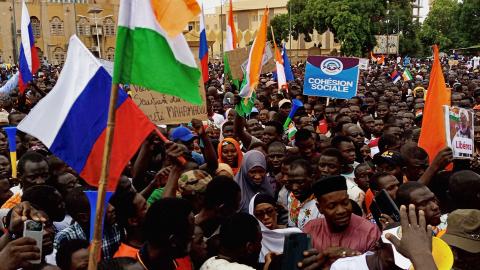A military junta cheered on by the Russian Wagner mercenary leader Yevgeny Prigozhin has overthrown Niger’s democratically elected president Mohamed Bazoum. As of Sunday afternoon, Bazoum remains imprisoned in his home with his family under harrowing conditions. Prigozhin is the same man who led the bizarre military march on Russia before abruptly ending the mission and turning to Belarus to help Moscow heighten its threats against NATO allies, Poland, and the Baltic nations. While the implications of that Wagner spectacle are still unfolding, Putin’s choice to keep Prigozhin alive and in the fold underscores the importance he places on Wagner’s exploits, including in Africa.
The African continent is home to a diverse population with a complex past. With courage and perseverance, Africans have overcome some of the worst human tragedies, embraced improvements in healthcare and technology, and through fits and starts of successful democratic governance, remain plagued by violence and corruption. The continent’s natural resources are plentiful, and its economic potential is enormous. It is now experiencing a population boom, with Niger boasting the highest growth rate. A place brimming with human life, youth, and energy, it is also an arena for brutal violence and exploitation of the weak and innocent. The African continent is a vibrant hub of Islamist violence and the staging ground for the international exportation of terrorism.
America’s top two adversaries, China and its junior partner Russia are engaged in a new Cold War against the United States and its global system of alliances. This China-Russian axis has taken a keen interest in exploiting fragile African nations to enrich and empower themselves at the expense of the West and with cruel disregard for the African people. Each expansionist authoritarian country has global ambitions to undermine U.S. influence worldwide, and from Europe to the Middle East to the Arctic, U.S. grand strategy must account for this. The Peoples Republic of China (PRC) and Russia sometimes collaborate directly or work in parallel to weaken U.S. influence, break up Western alliances, and enrich themselves, all while exploiting fragile governments and stoking violence.
The U.S. interest in African stability is not new. Recall during the Trump administration in 2017, when U.S. Green Berets lost their lives in Niger. At the time, Americans and even some members of Congress who should have known better had to be reminded about the importance of stability in Niger for U.S. interests in the entire region.
The U.S. military support (a small U.S. military footprint remained there) and U.S. interest in Niger are not rooted in a vaporous aim of nation-building, nor does it belong uniquely to any one administration. Stability and peace in Niger with a democratically elected government amenable to U.S. assistance and guidance has long been an enduring concrete U.S. interest. Niger has been a critical U.S. partner in counterterrorism and the fight to contain the spread of Islamist militantism, including Boko Haram and ISIS-West Africa.
But here’s what has been missing from U.S. strategy—a sustained cooperative effort in Niger with a security and diplomatic strategy that considers the impact of Africa within a framework of the long Cold War with the PRC-Russian axis.
The U.S. effort there has always been incoherent and tenuous, but the recent unraveling and the U.S. approach to it over the last few years should be a wake-up call. Like many countries across the region, Niger’s government was always under pressure of a potential violent overthrow by coups organized by militias—and supported by much larger and more powerful actors. But a few months ago, Secretary of State Antony Blinken cluelessly called Niger “a model of resilience, a model of democracy, a model of cooperation.”
And while Russia has used anti-Western messaging to turn African populations against the United States and Western allies (just check in with the UN General Assembly to see that several African nations have either voted against or abstained from condemning Russia’s war in Ukraine), the U.S. approach has played right into Russia’s hands. For instance, the Biden administration has made LGBTQ activism a hallmark of its diplomatic efforts. As scholar Michael Rubin has so ably outlined, hectoring nations with traditional social structures and cultures over social policies that are controversial even in the West has backfired.
Moreover, the economic vision that the United States has tried to pitch to the African Union has been motivated by climate ideology and teaching Africans to code—a dubious pitch to a continent with immediate and basic needs. China and Russia, of course self-servingly, offer bridges, roads, and security without any left-wing ideological colonization.
Washington must face reality, starting with understanding that offering liberty, self-determination, national sovereignty, and domestic security remains a far more attractive vision for African nations than the abuse that China and Russia provide. But that vision requires getting serious about working for stability and U.S. interests in the region rather than pushing leftist agendas. China and Russia are gaining ground in Africa. Is the United States going to sit back and watch?



















